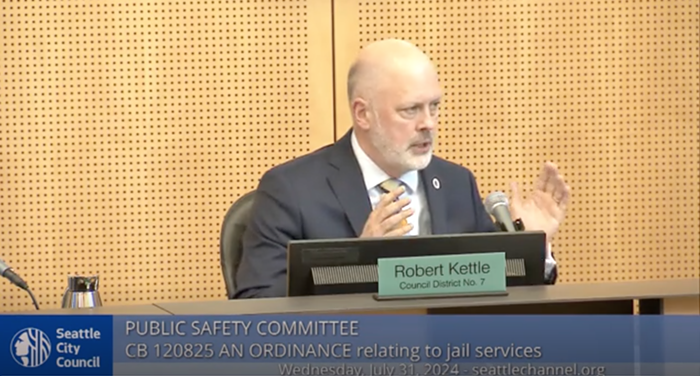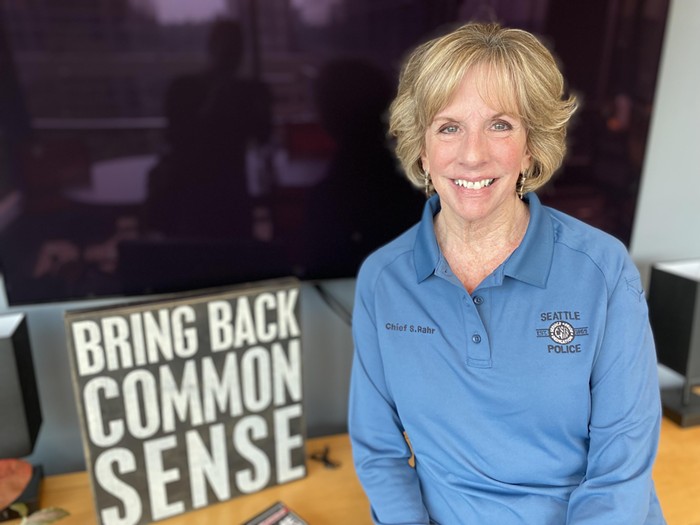Cops
Aug 16, 2024 at 9:00 am
Interim Seattle Police Chief Sue Rahr on SODA, SOAP, and Reinstating Prostitution Loitering Laws
Interim Seattle Police Chief Sue Rahr sitting next to a sign.
AN
Comments
Please wait...
Comments are closed.
Commenting on this item is available only to members of the site. You can sign in here or create an account here.




















I know this is really really hard for progressives to accept but sometimes its not about the individual. Sometimes its about the rest of us who are continually impacted by the individuals decisions/additction/mental issues. It may be traumatic to go to jail but its also traumatic to be assaulted by someone who is suffering from these issues or to have place of business continually smashed up and robbed to feed their addiction. Progressives insist that all resources be devoted to enabling someone until they are ready to accept treatment without regard to the impact that has on the surrounding community while we are waiting for them to get to the place where they are ready.
Given two difficult choices, traumatize someone who is suffering or traumatize the community impacted by their suffering I choose the community.
@1: "its also traumatic to be assaulted by someone"
Well then maybe we should focus police office time on preventing assaults and arresting people who commit assault rather than citing people for loitering...
"Well, because that's the choice. To leave them on the street to die or put them in a terrible system that will at least keep them alive."
Does she not know that multiple people have died in the jail the city of Seattle just contracted to send arrestees to?
@2 we do but as progressives like to remind us we need to focus on the root causes and if we can prevent these assaults and other activities from occurring through proactive enforcement we should do that as well.
"So then why add the trauma of arresting them?"
It's pretty clear that trauma here is a euphemism for withdrawals.
@5: Well then maybe we should also focus public servants and investment on root causes...which this...is not...
There's truly no bottom when it comes to SPD:
WA jails have among the highest death rates in the U.S. A new law to explain why isn’t working.
Seattle Times, March 26, 2023
Washington state’s jail mortality rate has been climbing for 20 years, and recently it ranked as one of the highest in the country....Washington ranked fourth highest nationwide by death rate inside its jails in 2019....The mortality rate in Washington jails has steadily risen since the early 2000s, and surpassed the national average in 2008,
This interview is heartbreaking. Rahr seems like an intelligent, compassionate person. But it's wild that she believes arresting people using drugs downtown or sex workers on Aurora, booking them into the SCORE jail, holding them for 24-48 hours, and then dumping them back on the street will help anyone keep anyone alive.
Seven deaths in custody at SCORE in a little over a year. An unknown number of deaths on the street because of forced detox in jail (reduced tolerance upon release).
Outreach to sex workers is already being done by community orgs. Hauling someone to jail and then trying to connect them to these same outreach workers doesn't do anyone a favor. It only expends vast amounts of money on criminal punishment that could have been granted to community orgs to expand their capacity.
Rahr: "It's a tragedy but what are we gonna do, let them die in the street or arrest them?"
TS: "How about provide more treatment beds?"
Rahr: "Too expensive. Jail it is."
Sociopathic.
Clearly what the left activists and the Stranger feel is best which amounts to just letting them use drugs and sell their bodies until they overdose and die, ignoring the collateral damage is not working. If anything it is cruel to let people slowly die under the guise of harm reduction.
@13: IMO it's truly hard to figure out where the boundaries of laziness, stupidity, and sociopathy are.
Here's her "concerned officer" example: "They won't accept services because they're so terrified of going through withdrawal. "
When might withdrawal start? 12 to 30 hours after the last dose.
So what does out caring officer do & Rahr suggest?
Absolutely terrorize them with the prospect of 24-4 hour bookings into jail...
Sigh...@10 (If you want to know, product of fighting cat off keyboard...)
@9 -- My feelings exactly. Rahr is a good cop, but she is only viewing it through her lens. The idea that these are the only two choices is ludicrous. She is merely approaching the problem from her perspective, as opposed to dealing with the big picture. The choices are artificially limited.
The solution is relatively simple: legalize it, tax it, regulate it. Crack down on human trafficking the same way you crack down on other forms of human trafficking that are just as common (e. g. nannies, house cleaners, etc.). If anything, it should be easier. The underground world of domestic-help slavery is fairly hard to monitor. But brothels should be much easier to manage. Word would get around if someone is being exploited (as it does in the strip clubs) and it shouldn't be too hard for the cops to find the assholes and throw the book at them. But there has to be complete amnesty for the women -- no jail, no deportation -- otherwise it won't work.
Meanwhile, we have to spend more money on drug treatment for the same reason. The judicial system and penal system are fucking expensive and not that effective.
No one from TS ever seems to admit that there are bad people out there that do not give a fuck about the rest of us. Pimps and dealers could give 2 shits about CARE etc. To look at Aurora, 3rd ave, 12th ave and not be disgusted is a failure of our society. Yes jail is not the best option for the addicts and prostitutes behind them is a snake that only cares about capital at all costs. Lock these fuckers up!
"I think a lot of people in the defund movement really believed that we were going to move one pot of money over into the other side. What I know through my experience is doing the treatment and the services are ten times more expensive than policing. There's a reason we've gone to policing as a substitute because it's less expensive. Even though the criminal justice system is wildly expensive, good treatment is way more expensive."
FINALLY, the Stranger admits to the lie behind "defund." It was NEVER going to save money, or even be "revenue-neutral." (Which, BTW, was Reagan's lie about his tax cuts. Yay Horseshoe Theory!) Alternative responders to police are a great idea. I'm glad to see Seattle has a pilot program going. Once Seattle gets larger programs going, these responders will themselves cost a lot of money, and guess what else? In the short term at least, you're going to need both more police, and more trainings for the police, because plenty of calls answered by alternative responders will also need police support, e.g. person who has gone into crisis now becomes violent. Both more police, and more training for them, mean more money for the police, at least in the short term. Defund was NEVER going to work, and every moment spent talking about it was not only obviously wasted, but squandered time spent talking about which police alternatives we wanted.
@10: Since you missed it entirely, she was referring to the choices WE have made, not to her own preferences. The only option WE have given HER is remove these persons to jail, or let them rot where they are -- with some number of them committing thefts and assaults. Given those options, Seattle has now decided, via the Council Members and Mayor voters have elected, to have her remove them to jail. This at least protects the some of the rest of the citizens for a while. If you don't like this policy -- and I doubt anyone does -- then blame the choices WE have made, over the nine years (and counting!) of Seattle's Homelessness Crisis.
We have met the Sociopathic, and they is us.
@16: "Once Seattle gets larger programs going, these responders will themselves cost a lot of money, and guess what else? In the short term at least, you're going to need both more police, and more trainings for the police, because plenty of calls answered by alternative responders will also need police support, "
No, not at all. The max base salary of a Seattle CARES responder is 2/3 that of a sworn officer (and that's not including the extras like longevity pay and body camera bonus officers get). For other types of response, the max salary of community service officer in a comparable department like San Jose is just over 1/2 the max of a sworn officer.
We already know from 10s of thousands of crisis calls from multiple cities that the need for sworn officers for backup is quite rare - on the order of 1 per 1,000 calls.
@17: "The max base salary of a Seattle CARES responder is 2/3 that of a sworn officer (and that's not including the extras like longevity pay and body camera bonus officers get). For other types of response, the max salary of community service officer in a comparable department like San Jose is just over 1/2 the max of a sworn officer."
Well, that's a wonderful message! We're going to save ourselves some money, by paying them less than we pay SPD officers for the same work. Great recruiting slogan and policy you have there. (Luckily, Seattle isn't one of the most expensive places to live in the entire country, right? Also, glad to learn the CARES team is the only type of alternate responder we'll ever need.) That miiiiiiiiiiight work, if we were talking about a 1:1 replacement, but the Homelessness Crisis means the current CARES team could just station themselves at Third & Pine and work non-stop there. (Hat tip to hbb, IIRC.) Coverage for the entire rest of the city will require more than the number of police officers replaced -- and that's with the generous assumption Seattle could stand to have SPD lose more officers. (A lot more.)
"We already know from 10s of thousands of crisis calls from multiple cities that the need for sworn officers for backup is quite rare - on the order of 1 per 1,000 calls."
Well, then, there's absolutely no need to spend a dime on training police and alternate responders to work together for that one-in-a-thousand call, because what could ever possibly go wrong if they respond together without having ever trained together? I mean, it's not like anyone could sue the city afterwards for negligence, right?
Thanks for your support of my points about "defund."
I think everyone on all sides of the issue want to solve this but none of the methods have worked entirely. There are side effects of all of the attempted policies that make them unsustainable and largely a failure. Truthfully, I think we are going to need breakthroughs in psychiatric and addiction care to be even able to touch this problem. Science too is expensive and prone to all kinds of problems but we continue to make strident gains in understanding the human mind. Homelessness and addiction come in all shapes and sizes and we really need a national comprehensive plan to address it as a human problem with as much empathy as possible but also trying to minimize the effects on the general populace who just want to be able to use there public parks and not have to avoid certain areas because they are taken over by encampments.
@18: "Well, that's a wonderful message! We're going to save ourselves some money, by paying them less than we pay SPD officers for the same work. "
ROTFL. The actual issue is that we are overpaying for sworn officers to do that work.
"Coverage for the entire rest of the city will require more than the number of police officers replaced -"
Not unless calls for service go up beyond what they are at present, in which case even if they did handling them with alternative responders would be cheaper and more effective than sworn officers.
"Well, then, there's absolutely no need to spend a dime on training police and alternate responders to work together for that one-in-a-thousand call"
Other departments have already done that, so we know the over under is a net cost savings.
@20 the reason many SPD make as much as they do it because they are working OT due the shortage of officers. If they were fully staffed the average SPD salary would be much lower (although total spend would go up). WA state already has the lowest per capita ration of officers to population in the country so I'm not sure where you find additional cuts.
The money needed for alternatives isn't in the first responders salary its in the follow up treatment and its effectiveness. What exactly are these new first responders going to do if their clients refuse treatment options or services? What services should they even be offered? Progressives will tell us we need to fund housing for all of them in one of the most expensive real estate markets in the country. That's not realistic thinking. What do we do with those who continually cycle through restorative justice programs? If the answer is rinse and repeat until such time that the individual actually follows through then you are going to spend an enormous sum of money for very little results and you'll find taxpayers will tire of that very quickly. If progressives really want people to get behind alternatives to police then they need to answer those questions. Until then police will continue to be a blunt force tool that isn't there to necessarily help those in distress, they are there to ensure their issues don't negatively impact the community.
@21 "If the answer is rinse and repeat until such time that the individual actually follows through then you are going to spend an enormous sum of money for very little results and you'll find taxpayers will tire of that very quickly."
Apparently not because you and others are still here advocating for yet more money for cops and jails, in other words "rinse and repeat" ad infinitum. Seattle taxpayers seem to strongly prefer spending "an enormous sum of money for very little results" to ever trying any new strategy to solve intractable problems--the ones who credulously accept the self serving assertions of police leadership anyway.
@22 your comment is exactly what I’ve been taking about. You lament wasted police resources because they are arresting the same person time and again. What you ignore is the peace provided the rest of society while that person is out of circulation. Police serve the greater community. The fact the person is not getting better is irrelevant. Resources continually squandered by junkies have no additional benefits. They are gone, money down the train.
@23 it's sad that you can't wrap your mind around even the possibility of a better solution
@21: Actually the reason Seattle police officers are collecting so much overtime is because our police department (unlike many others) has failed to civilianize lots of tasks that can be handled equally well or better for less money. We're paying sworn officers overtime because their regular shifts are being burned talking down people having a moment, taking after the fact property crime reports, and finding missing persons - among many other things - that an armed officer with powers of arrest shouldn't be spending any time on whatsoever.
Running the courts requires both judges and clerks. If we were paying judges a judge's salary to do the work of clerks and then complaining about a judge shortage we'd all recognize that as totally foolish.
That's how we're running public safety in Seattle today.
@22: 'Apparently not because you and others are still here advocating for yet more money for cops and jails, in other words "rinse and repeat" ad infinitum.'
That's not actually all of what @21 wrote. Here's the context you omitted: "What do we do with those who continually cycle through restorative justice programs? If the answer is rinse and repeat until such time that the individual actually follows through then you are going to spend an enormous sum of money for very little results and you'll find taxpayers will tire of that very quickly."
Restorative justice programs which do not actually work do still cost money, with no benefit to anyone. Locking someone up, only to release them to commit more crimes later, at least buys the victims of that repeat offender some temporary relief. Seattle has neglected the problem for such a long time, even lock-'em-up now seems like a better option.
None of this was ever necessary. If Seattle had swept the very first encampment when it appeared, and swiftly removed any subsequent encampment which appeared, none of this would have happened. If there were locals who still needed help, Seattle could be giving it to them. Allowing encampments, a policy the citizens had rejected in 2015, was imposed upon Seattle by elected officials (e.g. Pete Holmes) without the consent of the governed. That the Stranger now quotes Holmes as if his policy wasn't a major part of the problem just defies description.
@26 "Locking someone up, only to release them to commit more crimes later, at least buys the victims of that repeat offender some temporary relief"
So does putting them in rehab or a hospital, which unlike jail has the added benefit of maybe potentially helping them with their issues. But what I'm really talking about is trying to change conditions to prevent harm before it occurs rather than waiting for it to happen and myopically focusing on what is the right reaction. You guys want more and more pounds of cure because you can't or won't even try to imagine what an ounce of prevention might look like.
It's becoming clear that The Stranger and Seattle progressives consider people suffering from addiction to be expendable pawns in their project to bring about the revolution and glorious defeat of capitalism.
@27: I already told you about the "prevention" @26: sweeps. Remove every encampment. (This is what should have been done in 2015, but Pete Holmes and the City Council decided they knew better than the voters.) Most of the campers arrived in Seattle already homeless, as reported by the Seattle Homeless Needs Assessment in 2016 (https://www.seattle.gov/documents/Departments/HumanServices/CDBG/CityOfSeattle2016-HomelessNeedsAssessment.pdf). Seattle bears no responsibility for their problems, and never should have allowed them to stay.
"So does putting them in rehab or a hospital, which unlike jail has the added benefit of maybe potentially helping them with their issues."
Many of the homeless need help, and as this headline post notes, that help costs a huge amount more than even incarceration. Asking Seattle's citizens to foot the bill for anyone who arrives already homeless and needing services (and most of the homeless were already using drugs; same survey as above) was never going to work, and has never even been proposed. Hence, the pretense these persons were local "victims of capitalism," who just needed to camp for awhile until they saved enough money for rent.
"You guys want more and more pounds of cure because you can't or won't even try to imagine what an ounce of prevention might look like."
Again, I've already described the "prevention." I've long described this as a public-health crisis amongst new arrivals, not a housing-affordability issue amongst locals. The Stranger, and politicians it supports, have been the ones pretending otherwise. Please take your justified complaints to them. (Most of the latter have left office, due to voter rage at their failures.)
@28: I don't know if they've thought much about it, but they've simply ignored rampant overdose deaths long enough for it to be a possible explanation.
@29 sweeping encampments does nothing to prevent crime. You're out of your element.
@30: Hahahahahahahahaha… any remaining doubt you work at the Stranger just died a swift and overdue death.
@25 that's not the fault of the police and its not their duty to civilianize anything. That is up to the legislature. Remember the city tried this with parking enforcement and that resulted in them losing between $4M-$5M in parking revenues because they didn't do it correctly.
https://www.seattletimes.com/seattle-news/law-justice/seven-months-of-seattle-parking-tickets-canceled-due-to-lapsed-authority/
@27 so you are in favor of involuntary commitment then? Right now we can't force anyone to go to rehab or a hospital so the only alternative is jail if their actions are impacting the rest of the community. I applaud you for wanting to prevent harm before it occurs but where we diverge is what happens in between now and that solution. Progressives would tell us we just have to suck it up and put up with this bullshit and I like many others are over it. You also understate the enormity of what you are suggesting. You are talking about solving issues that lead to addiction and mental illness. The scope of that is not possible for a city like Seattle to solve. Understanding that, we have to make choices about how best to spend our limited resources and what has the greater benefit for the rest of the community.
@32: My sweet brother (or sister) in Christ, civilianization is bog standard competent police administration. This is from a 2024 Police Executive Research Forum (PERF), a police-chief-run organization report called "Embracing Policing: Integrating Professional Staff to Advance Modern Policing:"
"In the San Jose Police Department, the CSO position was born out of a shortage of police officers. “We had to do it to meet minimum staffing on the street every day in patrol without spending a ton of overtime,” according to Acting Chief Paul Joseph. In the Orange County (FL) Sheriff ’s Office, Field Service Officers (FSOs) take non-emergency calls such as burglary reports, animal cruelty complaints, and some of the lower-level property
crimes that don’t involve a suspect. “Soon,” says Undersheriff Mark Canty, “they’re also going to be
tasked with doing traffic crash investigations....In the Sacramento Police Department, “Community Service Officers handle calls like minor traffic accidents, second degree burglaries, and missing persons that aren’t at risk,” according to Deputy Chief Greg Halstead. “We’ve had that position for a long, long time — since I got hired."
I had an issue of the FBI Law Enforcement Bulletin which had an article about civilianization written by a police administrator on my desk, in a police department... in 1994.
@32 Washington has involuntary commitment currently
@everyone, legalize these services. this is about harm reduction for everyone. this sounds like the conversation about pot 20 years ago. this is fucking insane that it is a subject anymore. let's see some legislation which protects this legitamate industry and helps to try and take care of those who work in it. outlawing has and never will work. for fuck sake, we have strip clubs, now they are even allowed to serve alcohol. it took decades for that to happen. this is completely just rediculous.
The people who propose more jails and more sweeps are the same who don't want to spend tax dollars on social services and housing: their solution is to make the problem magically disappear, not solve it. Not only do they cause the problem by advocating for less social spending but they don't want to see the end result of their policies. Never mind that it has never worked before.
@36 No, we recognize that there just isn't enough money to fulfill the vision of housing first (and there never will be) and we are tired of seeing the resources we do spend on this issue go to waste because the harm reduction crowds seem to think we need to enable behavior and make people comfortable until they are ready to get better without any regard to the impact they have on the community around them. Seattle is a very empathetic city when it comes to social issues but there has to be a balance between the needs of the individual who is suffering from addiction and the greater community. For all your criticism about those who want some small piece of accountability for people who negatively impact the community with their actions you overlook the fact that housing first has been a complete failure as well.
https://www.wweek.com/news/2023/06/07/a-28-million-low-income-apartment-complex-descends-into-chaos-in-just-two-and-a-half-years/
@37 there's not enough money to try other approaches because we keep setting it all on fire sending armed police to address behavioral crises and other nuisances, because people like you lap up the cops' bullshit about there being no other options (see for example @32 where you incorrectly asserted people can't be involuntarily held in hospitals when warranted, apparently because Rahr said so in this article).
@38: Seattle keeps setting money ablaze by wasting it on a pastiche of ineffective homeless-service providers, instead of taking the same amount of money and focusing it on those providers who can demonstrate results. Over the past ten years, multiple outside consultants have told the city this, but no reform ever happens:
https://www.seattle.gov/documents/Departments/HumanServices/Reports/HomelessInvestmentAnalysis.pdf
https://govlab.hks.harvard.edu/files/govlabs/files/seattle_homelessness_project_feature.pdf?m=1548707682
https://static1.squarespace.com/static/53206c76e4b0da7cd7fb97f6/t/57f39220cd0f68202b3705ba/1475580452747/Seattle+BPA+Final+Report+8.15.16.pdf
https://kcrha.org/wp-content/uploads/2019/06/future-lab-report.pdf
https://www.mckinsey.com/~/media/McKinsey/Featured%20Insights/Meeting%20societys%20expectations/Booming%20cities%20unintended%20consequences/Booming-cities-unintended-consequences.pdf
@39 Seattle spent $111 million on homelessness interventions last year. They spent $374 million on SPD.
@40: So, that’s around a billion dollars Seattle alone has spent on homelessness, since Mayor Murray declared a “Homelessness Crisis.” Look around; tell everyone what Seattle got for those funds. (Start with the overdose deaths.)
@41 they spend a billion dollars every three years on cops, look around and tell everyone what Seattle got for those funds
So the chief executive officer of SPD seems to be super broken up about "We don't have a system in place to make that happen" [that being treatment] and so sad that she has no choice but "To leave them on the street to die or put them in a terrible system that will at least keep them alive. It's two horrible choices."
Here's how SPD proposed spending millions of dollars in funding for officers it knows it can't hire in the 2023-2024 budget:
"In alignment with staffing projections, salary savings from an additional 120 officer vacancies are also being proposed to be reinvested in SPD’s budget for equipment and technology upgrades, strategies to improve recruitment and retention, improvements to internal trainings and supportive services, and other community safety program enhancements."
A bunch of goodies for the department.
No shame.
Pathetic stuff.
@42: So, you’re admitting the answer is “nothing”?
Because I'm pretty sure Seattle could have homeless addicts dying on the streets without ever having paid a dime for it.
@35, I wish the logistics/details of this were on the table. It's not like Seattle doesn't have a rich history of sex work in its relatively short life. Zoning issues/proximity to schools would probably make Aurora N what it is now, just with some guardrails/harm reduction. But just as as liquor stores in some states are identified by red dots…
"In 1976, the rules were further clarified, specifying that "Red dots not exceeding thirty-six inches in diameter may be placed on each side of the building and on the rear and front of the building.""
I am sure would could find some appropriate sign language to denote these businesses…no neon, no flashing lights, letters of a restricted size, etc.
And as usual the two sides of this are about human/civil rights through harm reduction and property rights protection through law 'n order. If we legalized weed, we could follow up other civic scrourges that are not going away, no matter how hard we legislate or prosecute.
https://www.southeasterndispatch.com/features/Why-Do-Liquor-Stores-Have-Red-Dots
We’ve invested massive sums of money attempting to address “root causes” for my entire lifetime. And it has turned out that we’ve either misdiagnosed the “root causes” but refuse to admit that. Or that “root causes” have just been an excuse to funnel money to friends.
You can tell someone is either corrupt or stupid when they use the phrase “root causes”.